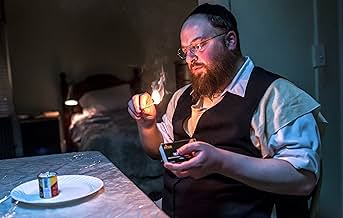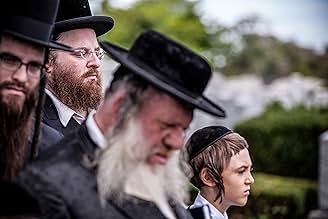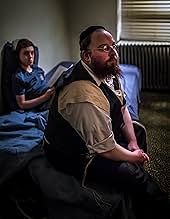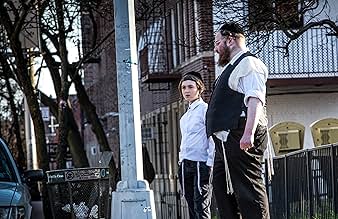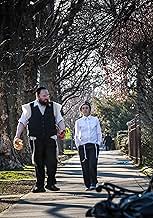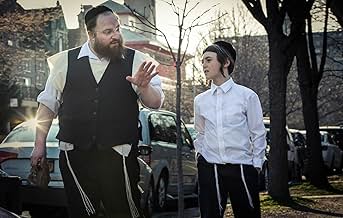IMDb-BEWERTUNG
6,6/10
2708
IHRE BEWERTUNG
Innerhalb der ultra-orthodoxen jüdischen Gemeinde von Brooklyn kämpft ein Witwer um das Sorgerecht für seinen Sohn. Ein liebevoll erzähltes Filmdrama mit allen Dialogen in jiddischer Sprache... Alles lesenInnerhalb der ultra-orthodoxen jüdischen Gemeinde von Brooklyn kämpft ein Witwer um das Sorgerecht für seinen Sohn. Ein liebevoll erzähltes Filmdrama mit allen Dialogen in jiddischer Sprache, in dem das Wesen des Glaubens und der Preis der Elternschaft erkundet wird.Innerhalb der ultra-orthodoxen jüdischen Gemeinde von Brooklyn kämpft ein Witwer um das Sorgerecht für seinen Sohn. Ein liebevoll erzähltes Filmdrama mit allen Dialogen in jiddischer Sprache, in dem das Wesen des Glaubens und der Preis der Elternschaft erkundet wird.
- Auszeichnungen
- 7 Gewinne & 18 Nominierungen insgesamt
Meir Ber Schwartz
- The Ruv
- (as Meyer Schwartz)
Melissa Weisz
- Bayla
- (Synchronisation)
Empfohlene Bewertungen
This movie causes tremendous anguish, okay Menashe can't be considered what we usually call a responsible adult, but the rules on fatherhood revolted me extremely, it hurt, to see the love for the child and the mandatory absence (no father and mother a child can't study) absurd... Slow, delicate, simple, a pure portrait of father/son love and Jewish traditions. Menashe's plot is loosely based on Lustig's life. In an interview with the Los Angeles Times, he said that "unlike Menashe in the movie, I'm not a schlimazel by nature. Maybe just a schlimazel by situation."
Really like the film.
I'm hoping that I got a pretty actuate perceptive on the Hasidic Jewish community. I'm aware of some aspects about how women are treated as a whole, which for me, made it more interesting that the movie tells a story about a widowed father trying to raise his son in a society that says he can't do it.You don't see that enough in movies in general. A man doing what he has to to be a man in order to raise his child alone, and I'm seeing it in the most rarest prospective.
It reminds me of Moonlight, it's not really a story I've never herd before but nobody tells the story from this unique angel.
Brilliant! http://cinemagardens.com
I'm hoping that I got a pretty actuate perceptive on the Hasidic Jewish community. I'm aware of some aspects about how women are treated as a whole, which for me, made it more interesting that the movie tells a story about a widowed father trying to raise his son in a society that says he can't do it.You don't see that enough in movies in general. A man doing what he has to to be a man in order to raise his child alone, and I'm seeing it in the most rarest prospective.
It reminds me of Moonlight, it's not really a story I've never herd before but nobody tells the story from this unique angel.
Brilliant! http://cinemagardens.com
"Menashe" (2017 release; 82 min.) brings the story of a widower named Menashe and his 10 yr. old son Rieven. As the movie opens, it is clear we are in the Hasidic Jewish community in New York, as we see Menashe get to work in a grocery-type store. After work, he joins others in a testy discussion as to what the "real" rules of the Hasidic Jewish community are. It's not long, though, before we learn that Menashe has a son, but, per the Hasidic Jewish rules, he cannot live with Menashe and instead is being raised by the boy's uncle (the brother of Menashe's deceased wife) and his family. Menashe is desperate to see his boy more often, and to get him to return home... At this point we are 10 min. into the movie, but to tell you more would spoil your viewing experience, you'll just have to see for yourself how it all plays out.
Couple of comments: this movie is not the first one about life in the Hasidic Jewish (or Orthodox Jewish) community, yet it is striking once again for someone like myself (a con-Jewish outsider) how incredibly restrictive life is within the confines of that community. The rabbi decides everything. When Menashe appeals to the Rabbi to let his son live with him, the Rabbi responds: "the Torah requires three things: a nice wife, a nice house, and nice dishes", without the slightest of hesitation or irony, wow... The movie reminds of a couple of other movies: "Gett" (the movie about divorce in the Orthodox Jewish community), and... "Kramer vs. Kramer", yes the 1979 classic, where Dustin Hoffman raises his 6 year old boy. Several scenes from "Menashe" are eerily similar. Beware: for whatever reason, the production team of "Menashe" decided to film many scenes in an extreme close-up angle, which at time is quite disorienting (perhaps that was the very intent of it).
"Menashe" premiered at this year's Sundance film festival to immediate critical acclaim, and recently opened at my local-art house theater here in Cincinnati. The Tuesday evening screening where I saw this at was heavily attended. somewhat to my surprise, but this is welcome news. Indeed, if you are in the mood to get a glimpse of what life in the Hasidic Jewish community is really like (almost documentary-like), you will be well-served with this movie, and I'd readily recommend you seek this out, be it in the theater, on VOD or eventually on DVD/Blu-ray.
Couple of comments: this movie is not the first one about life in the Hasidic Jewish (or Orthodox Jewish) community, yet it is striking once again for someone like myself (a con-Jewish outsider) how incredibly restrictive life is within the confines of that community. The rabbi decides everything. When Menashe appeals to the Rabbi to let his son live with him, the Rabbi responds: "the Torah requires three things: a nice wife, a nice house, and nice dishes", without the slightest of hesitation or irony, wow... The movie reminds of a couple of other movies: "Gett" (the movie about divorce in the Orthodox Jewish community), and... "Kramer vs. Kramer", yes the 1979 classic, where Dustin Hoffman raises his 6 year old boy. Several scenes from "Menashe" are eerily similar. Beware: for whatever reason, the production team of "Menashe" decided to film many scenes in an extreme close-up angle, which at time is quite disorienting (perhaps that was the very intent of it).
"Menashe" premiered at this year's Sundance film festival to immediate critical acclaim, and recently opened at my local-art house theater here in Cincinnati. The Tuesday evening screening where I saw this at was heavily attended. somewhat to my surprise, but this is welcome news. Indeed, if you are in the mood to get a glimpse of what life in the Hasidic Jewish community is really like (almost documentary-like), you will be well-served with this movie, and I'd readily recommend you seek this out, be it in the theater, on VOD or eventually on DVD/Blu-ray.
"Menashe" is a semi-documentary, reflecting the case of Menashe Lustig, the actor performed the main character. A film about laws of an ultra conservative community, about parenthood and about life. And , sure, about vulnerable people. Touching and delicate and precise, the work of Menashe Lustig is just admirable. He is the film and I admitt, I saw me reflected in his beautiful portrait of the single father , lost across the challenges, naive and man of good intentions, prisoner of his life. So, a gem . A real special one because it is not a lesson but a confession, honest at whole.
Menashe is an authentic, emotional masterpiece telling the story of a kind, hapless, Hasidic grocery store clerk who battles to keep his family together after his wife dies. Directed by Joshua Z. Weinstein and starring Menashe Lustig, the film was shot clandestinely because of the beliefs of the Orthodox Jewish sect. I love this film because it took willpower to make. You can't say that about many films nowadays.
Menashe is about a kindhearted, but miserable grocery store employee that must remarry in order to care for his only son. It is against the Hasidic beliefs that a child be taken care of without a mother in the home. While Menashe ponders his situation, his well-off brother-in-law is given custody of Rieven by their Rabbi. Menashe is frustrated by this and is only able to get back custody of his son for a week, while he looks for a new wife. It doesn't seem that he really wants to get remarried, because when he goes on one date he isn't particularly friendly.
Unlike the rest of his family and friends, Menashe is more at ease with the secular society surrounding them in Brooklyn. He dresses more casually, without the requisite black hat and coat. While he takes his religion seriously, he wants to embrace life and freedom, more than the sect allows. My favorite part of this film is when Menashe drinks malt liquor with the Hispanic employees after his late night shift. They talk about life and try to get Menashe back on track.
One of the attributes of this film is the way it educates you about the culture of ultra Orthodox Judaism. The other very impressive fact is that it is the first film in 70 years to be filmed in Yiddish. Most of the film is subtitled for those who don't speak Yiddish. Both Menashe Lustig and young Ruben Niborski convey the closeness they have between father and son. One downside of the film is that it is low budget, which is reflected in its grainy resolution. Some of that could also be due to the fact that it was shot in secret.
I give this film 4 out of 5 stars for its authenticity and emotional punch. I recommend it for ages 13 through 18. The film is in limited release throughout the country at art house cinemas.
Reviewed by Clayton P., KIDS FIRST! Film Critic.
Menashe is about a kindhearted, but miserable grocery store employee that must remarry in order to care for his only son. It is against the Hasidic beliefs that a child be taken care of without a mother in the home. While Menashe ponders his situation, his well-off brother-in-law is given custody of Rieven by their Rabbi. Menashe is frustrated by this and is only able to get back custody of his son for a week, while he looks for a new wife. It doesn't seem that he really wants to get remarried, because when he goes on one date he isn't particularly friendly.
Unlike the rest of his family and friends, Menashe is more at ease with the secular society surrounding them in Brooklyn. He dresses more casually, without the requisite black hat and coat. While he takes his religion seriously, he wants to embrace life and freedom, more than the sect allows. My favorite part of this film is when Menashe drinks malt liquor with the Hispanic employees after his late night shift. They talk about life and try to get Menashe back on track.
One of the attributes of this film is the way it educates you about the culture of ultra Orthodox Judaism. The other very impressive fact is that it is the first film in 70 years to be filmed in Yiddish. Most of the film is subtitled for those who don't speak Yiddish. Both Menashe Lustig and young Ruben Niborski convey the closeness they have between father and son. One downside of the film is that it is low budget, which is reflected in its grainy resolution. Some of that could also be due to the fact that it was shot in secret.
I give this film 4 out of 5 stars for its authenticity and emotional punch. I recommend it for ages 13 through 18. The film is in limited release throughout the country at art house cinemas.
Reviewed by Clayton P., KIDS FIRST! Film Critic.
Wusstest du schon
- WissenswertesDirector Joshua Z Weinstein, who is neither a member of a Haredi community nor a speaker of Yiddish, used a translator on set.
- SoundtracksIvdu Es Hashem Mit Simcha
Written and performed by Michoel Schnitzler
Courtesy of Michoel Schnitzler
Top-Auswahl
Melde dich zum Bewerten an und greife auf die Watchlist für personalisierte Empfehlungen zu.
- How long is Menashe?Powered by Alexa
Details
- Erscheinungsdatum
- Herkunftsländer
- Offizieller Standort
- Sprachen
- Auch bekannt als
- 我和我的不完美老爸
- Drehorte
- Produktionsfirmen
- Weitere beteiligte Unternehmen bei IMDbPro anzeigen
Box Office
- Bruttoertrag in den USA und Kanada
- 1.703.036 $
- Eröffnungswochenende in den USA und in Kanada
- 62.078 $
- 30. Juli 2017
- Weltweiter Bruttoertrag
- 1.962.265 $
- Laufzeit
- 1 Std. 22 Min.(82 min)
- Farbe
- Sound-Mix
- Seitenverhältnis
- 2.00 : 1
Zu dieser Seite beitragen
Bearbeitung vorschlagen oder fehlenden Inhalt hinzufügen




